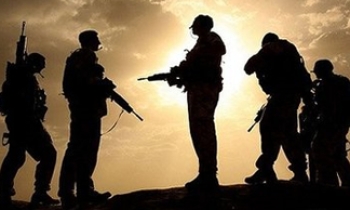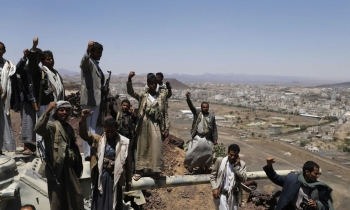Despite the government’s claims to the contrary, Yemen’s press is still struggling against confining shackles, said a new report on press freedom issued by Freedom House, an independent nongovernmental organization based in Washington, D.C. that supports the expansion of freedom in the world. The new report gives Yemen a mark of 80 out of 100, which is considered a low mark, said the report. The Survey of the Freedom of Press 2007 stated that there are many laws that could be good for the press, but they are not actually put into practice.
The report also itemized several incidents and violations against journalists and newspapers. “Jamal Amer, editor-in-chief of the independent newspaper al-Wasat, who was abducted, beaten, and threatened by suspected government agents in August 2005, continued to be harassed in 2006,” said the study. It also mentioned the closure of the three newspapers last year for the publications of the now-infamous Danish cartoons. Kamal al-Olufi of al-Rai al-Am, Mohammed al-Assadi, former editor-in-chief of the Yemen Observer, and two journalists from al-Hurriya were all convicted at the end of the year and received various sentences ranging from the suspension of their papers, temporary writing bans, fines, and prison terms, said the study.
Also, it mentioned the restriction upon the visual media. “More than 70 percent of the population lives in rural areas where newspapers are not distributed and the country has a high rate of illiteracy. Most people receive their news from the radio and television; however, the state maintains a monopoly on all broadcast media. There is currently no procedure for licensing independent media.” “I agree with the results 150 percent,” said Najeeb al-Yafe’e, the editor-in-chief of the Nass Press website. Yafe’e said that after the presidential election, there was an unprecedented narrowing of the freedom of the press.
These restrictions placed on all media demonstrate the government’s inability to handle the criticism of the press. The government cannot handle the press talking about certain topics—the economy or information about the war, like the current war in Sa’ada. “What else could explain the blocking of esthraki.net?” he said. Al-Yafe’e said that restrictions are increasing daily. “The Ministry of Information has ordered the closure of SMS news services, like Nass mobile and the SMS service of Women Journalists Without Chains,” he said. But this is not applicable to the services of Yemen mobile phone Company that provides this service to (the official) Saba news agency and the other governmental media, he said.
“This report is too confusing,” said Nabil al-Sofi, the editor-in-chief of the News Yemen website. He felt that in spite of the many press violations, Yemen is many times better than its neighboring countries. The ability of the Yemeni press to speak up and also to express its disagreement is unlike the situation of the press in neighboring countries, where only the voice of the ruler can be heard. Al-Sofi felt the time right after the presidential election was a good time for journalists, but then the attacks started up again. “The years 2003 and 2004 were the worst in the history of journalism,” he said.
The solution for all that is to continue the dialogue. This was his view in regard the political attacks on the journalism. Others agree that the press in Yemen is much freer than that of its neighboring countries. “They only talk about the comparisons, but they don’t mention the standards of press freedom,” said Sami Ghaleb, the official in charge of freedoms at the Yemeni Journalists Syndicate. “From 1990 to 1994, there was not one case against a journalist except for one newspaper that insulted university students and that was ok with the entire journalism community.”
The problem is that the government deals with media with the mentality of the 80s, he said. This means that the first thing the government does is to monopolize the radio and then it makes its announcements through that, he said. The government currently allows only the governmental institutions to control the audio and visual media, like Saba agency and Sana’a radio, he said. This method ensures that, “the opposition voices will be silenced,” he said. All the restrictions codified in the law, such as the need for licenses, are only geared against the opposition or private newspapers.
“There are many officials who can easily get licenses for newspapers, whereas other journalists have fought for more than a year and a half to get a license,” he said. Ghaleb believes this time is a bad time for the Yemeni press. “There are some political crises which have reflected negatively upon press,” he said. The war in Sa’ada is one of the issues that the government has made impossible for the press to cover, denying all journalists access to the area, he said. Furthermore, websites that address these topics are shut down or blocked, such as eshtraki.net.
The past several months have witnessed many lows in term of press freedoms, he said. “In the public media, there are attacks on the private and the opposition newspapers,” he said. There are soft threats as well as actual attacks on the journalists for their opinions, he said. “The scope of press freedom is narrow and the authority is now making it narrower.” “It deserves it, it really deserves it,” Mohammed al-Sabri, the spokesperson of the JMP, said laughingly about the assessment of the government in the new report.
“A letter of seven words scares the government,” he said. The problem is that the government discriminates against opposition and private newspapers, he said. But the government newspapers receive both financial and political support, said al-Sabri. “This will lead to inciting hatred among the journalists themselves.” Perhaps a national conference on press freedom should be held by an NGO to discuss all press issues, he said.
The status of press freedoms in Yemen is schizophrenic; seeing to take two steps backward for every step forward. “We were happy that the ceiling of press has been raised, but it now declining,” he said. However, Minster of Information Hassan al-Lawzi disagreed whole-heartedly with the report’s indictment. “[The report] is totally untrue,” he said angrily. “They have just to come to Yemen, and saw with their own eyes how the private and opposition newspapers criticize,” he said.
Such reports take their information from unreliable resources that do not know anything about Yemen, he said. “As such, those reports are not reliable as long as they have no reliable sources,” he said. “They have been given deceitful information,” said al-Lawzi, “whoever says this is either an ignoramus or a pretender.” Daniel Simons, a British lawyer with the Article 19 organization, said that a free press is very important to democracy. “But it is important not to overlook the broadcast media,” he said.
Most of the Yemenis will get news from broadcast media, because most of the Yemenis cannot read, he said. “The control of the broadcast media is to the advantage of the ruling party and the government. In this sense, the last elections in Yemen were not fair, even though the actual voting process was conducted in an honest way,” he said. Simons believes that officials sincerely believe that the freedom of expression in Yemen is good. “From my own experience, I have no reason to doubt that these officials are not sincere in their beliefs.
“They compare Yemen with other countries in the region, which are among the least free in the world, and then the picture doesn’t look so bad. And when they do look at other countries, they look to Europe and the United States, and of course there is a big difference in culture and economic situation, which in their view justifies a gap in freedom too.” However, he felt that it is shameful of Yemen not to look to the experiences of other countries.
“Indonesia, for example, has made much greater progress with freedom of expression than Yemen, and has adopted a progressive press law,” he said. Simons believes that the way to make progress is to have a constructive dialogue for more freedom of expression. “I believe there is a willingness in the government to consider serious reforms, but there is also fear of the
consequences and uncertainty about how to proceed.
Yemenis need to keep pointing to the fact that, worldwide, societies that have increased freedom of expression have also become more prosperous and more peaceful, not less. [Yemenis] should also take responsibility for their own fate and make concrete and realistic proposals to the government for reform, rather than just presenting demands.”









